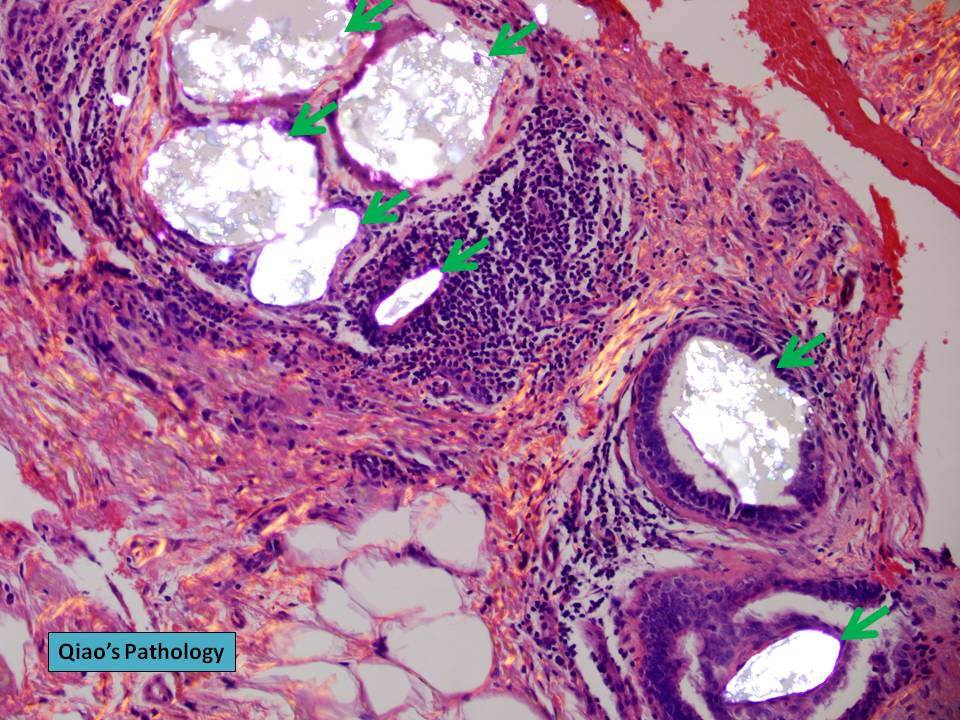ถามมา-ตอบไป กับ นิ่วในไต
8 ปีที่ผ่านมา
โดย เจ้าของร้าน

รายการ หมอนอกกะลา
ตอน ถามมา-ตอบไป กับ นิ่วในไต
ຫຼັງຈາກທີ່ໄດ້ພົບປະກັບຜູ່ປ່
ສະບາຍດີ
:อาหารประเภทใดที่ดิฉันควรก
:แคลเซียมไม่ได้เป็นศัตรู หากคุณมีแคลเซียมในปัสสาวะส
นิ่วในไตชนิดที่เป็นแคลเซีย
ปริมาณของออกซาเลตในอาหารแต
หลายงานวิจัยแนะนำว่าการ”จำ
งานวิจัยใหม่ๆชี้ให้เห็นว่า
:ผมมีนิ่วกรดยูริค มันคืออะไร ผมต้องกินและไม่กินอะไรครับ
:เป็นอีกชนิดหนึ่งที่พบบ่อย
เพื่อป้องกันไม่ให้เป็นนิ่ว
ฟรักโตสสูง จำกัดการดื่มเครื่องดื่มแอล
การรับประทานอาหารโปรตีนจาก
นอกจากนี้คุณควรแน่ใจว่าได้
นิ่วในไตเรื้อรังโดยทั่วไปจ
และดังนั้นจึงป้องกันพวกกัน
:มันจะช่วย หรือ ทำร้ายดิฉันมั๊ยคะถ้าจะใช้ว
:วิตามินบี (ซึ่งรวมถึง thiamine, riboflavin, niacin, B6 และ B12) ยังไม่มีการรับรองใด ๆ ว่าจะเป็นอันตรายต่อผู้ที่ม
ส่วนตัวผมนิยมใช้แร่ธาตุคีเ
อ็อกซาเลต
ด้วยความห่วงใยจากใจจริง
สวัสดี
:What type of diet should I follow? Will I have to avoid high calcium foods?
:Calcium is not the enemy. If you have high calcium in the urine then sodium reduction is helpful for stone prevention. Instead of reducing your calcium intake, focus on limiting the sodium in your diet and pair calcium-rich foods with oxalate-rich foods. Extra sodium causes you to lose more calcium in your urine, putting you at risk for developing another stone. Your doctor will probably advise you to limit sodium to 2,000 milligrams each day. There are many sources of "hidden" sodium such as canned or commercially processed foods as well as restaurant-prepared and fast foods. A dietitian help you understand food labels and make changes in the amount of sodium that you eat. If you do not have high calcium in the urine then for stone reduction you might be better off focusing on other dietary changes. Your doctor or registered dietitian can help determine if you need more or less calcium and help you plan a diet that is healthful.
:I had an oxalate stone. What type of diet should I follow? Do I need to avoid foods high in oxalate?
:Calcium oxalate kidney stones are the leading type of kidney stones. Oxalate is naturally found in many foods, including fruits and vegetables, nuts and seeds, grains, legumes, and even chocolate and tea. Some examples of foods that contain high levels of oxalate include: peanuts,
The oxalate content of food can vary due to differences in such things as soil quality and state of ripeness. There may be variation in published data, too, as different methods may be used to determine the oxalate content of food.
Some research suggests that limiting high oxalate foods may help reduce your chance of forming another oxalate stone. However, many high oxalate foods are healthful so it is wise to not overly restrict your diet if not necessary. Most kidney stones are formed when oxalate binds to calcium while urine is produced by the kidneys. New research indicates that eating and drinking calcium and oxalate-rich foods together during a meal is a better approach than limiting oxalate entirely because oxalate and calcium are more likely to bind to one another in the stomach and intestines before the kidneys begin processing, making it less likely that kidney stones will form.
:I had a uric acid stone. What does that mean? What type of diet should I follow?
:Another common type of kidney stone is a uric acid stone. Red meat and shellfish have high concentrations of a natural chemical compound known as a purine.
leads to a higher production of uric acid which then accumulates as crystals in the joints, or as stones in the kidneys.
To prevent uric acid stones, cut down on high-purine foods such as red meat, organ meats, and shellfish, and follow a healthy diet that contains mostly vegetables and whole grains, and low fat products. Limit sugar-sweetened foods and drinks, especially those that contain high fructose . Limit alcohol because it can increase uric acid levels in the blood and avoid crash diets for the same reason. Eating less animal-based protein and eating more vegetables will help decrease urine acidity and this will help reduce the chance for stone formation.
You should also be sure to drink at least three quarts (12 cups) of water a day to help reduce the risk for stone formation. Making these healthy lifestyle changes can also help reduce your risk for developing gout because high uric acid is a leading risk factor for gout.
Chronic kidney stones are often treated with potassium citrate. Studies have shown that limeade, lemonade and other fruits and juices high in natural citrate may offer similar stone-preventing benefits. It is believed that citrate in the urine may prevent the calcium from binding with other constituents that lead to stones. Also, some evidence suggests that citrate may prevent crystals that are already present from binding with each other, thus preventing them from getting bigger. Please note that juices made from actual limes and lemons contain higher levels of citrate and beware of the sugar content in juices, because this can increase kidney stone risk.
Will it help/hurt me to take a vitamin or mineral supplement?
The B vitamins (which include thiamine, riboflavin, niacin, B6 and B12) have not been shown to be harmful to people with kidney stones. In fact, some studies have shown that B6 may actually help people with high urine oxalate. However, check with your dietitian for advice on the use of vitamin C, vitamin D, fish liver oils or mineral supplements containing calcium and magmesium since some supplements can increase the chances of stone formation in some people.
I usually use chelated minerals to break down calcium- oxalate bond.
ขอขอบคุณ National Kidney Foundation 2015
ภาพสวย ๆ จาก Google
ค้นหาสินค้า
หมวดหมู่สินค้า
ระบบสมาชิก
คุณเป็นตัวแทนจำหน่าย
- ระดับ{{userdata.dropship_level_name}}
- ไปหน้าหลักตัวแทน
ระดับสมาชิกของคุณ ที่ร้านค้านี้
รายการสั่งซื้อของฉัน
- ทั้งหมด {{(order_nums && order_nums.all)?'('+order_nums.all+')':''}}
- รอการชำระเงิน {{(order_nums && order_nums.wait_payment)?'('+order_nums.wait_payment+')':''}}
- รอตรวจสอบยอดเงิน {{(order_nums && order_nums.wait_payment_verify)?'('+order_nums.wait_payment_verify+')':''}}
- รอจัดส่งสินค้า {{(order_nums && order_nums.wait_send)?'('+order_nums.wait_send+')':''}}
- รอยืนยันได้รับสินค้า {{(order_nums && (order_nums.wait_receive || order_nums.wait_confirm))?'('+(order_nums.wait_receive+order_nums.wait_confirm)+')':''}}
- รอตรวจสอบข้อร้องเรียน {{(order_nums && order_nums.dispute)?'('+order_nums.dispute+')':''}}
- เรียบร้อยแล้ว {{(order_nums && order_nums.completed)?'('+order_nums.completed+')':''}}
- ทั้งหมด {{(order_nums && order_nums.all)?'('+order_nums.all+')':''}}
- รอการชำระเงิน {{(order_nums && order_nums.wait_payment)?'('+order_nums.wait_payment+')':''}}
- รอตรวจสอบยอดเงิน{{(order_nums && order_nums.wait_payment_verify)?'('+order_nums.wait_payment_verify+')':''}}
- รอจัดส่งสินค้า {{(order_nums && order_nums.wait_send)?'('+order_nums.wait_send+')':''}}
- ส่งสินค้าเรียบร้อยแล้ว {{(order_nums && order_nums.sent)?'('+order_nums.sent+')':''}}
ติดต่อเรา
0971654697
ติดตามสินค้า
เว็บเพื่อนบ้าน
หน้าแรก | วิธีการสั่งซื้อสินค้า | แจ้งชำระเงิน | บทความ | เว็บบอร์ด | เกี่ยวกับเรา | ติดต่อเรา | ตะกร้าสินค้า | Site Map
ร้านค้าออนไลน์
Inspired by
LnwShop.com (v2)
▲
▼
รายการสั่งซื้อของฉัน
รายการสั่งซื้อของฉัน
ข้อมูลร้านค้านี้

SANTI MANADEE
ไม่เอาภาระเข้าร่างกาย เอาสิ่งดี ๆ ใส่ให้กับร่างกาย คุณก็จะมีสุขภาพดี
เบอร์โทร : 0971654697
อีเมล :
อีเมล :
ส่งข้อความติดต่อร้าน
เกี่ยวกับร้านค้านี้
ค้นหาสินค้าในร้านนี้
ค้นหาสินค้า
สินค้าที่ดูล่าสุด
บันทึกเป็นร้านโปรด
Join เป็นสมาชิกร้าน
แชร์หน้านี้
แชร์หน้านี้
↑
TOP เลื่อนขึ้นบนสุด
TOP เลื่อนขึ้นบนสุด
คุณมีสินค้า 0 ชิ้นในตะกร้า สั่งซื้อทันที
สินค้าในตะกร้า ({{total_num}} รายการ)

ขออภัย ขณะนี้ยังไม่มีสินค้าในตะกร้า
ราคาสินค้าทั้งหมด
฿ {{price_format(total_price)}}
- ฿ {{price_format(discount.price)}}
ราคาสินค้าทั้งหมด
{{total_quantity}} ชิ้น
฿ {{price_format(after_product_price)}}
ราคาไม่รวมค่าจัดส่ง
➜ เลือกซื้อสินค้าเพิ่ม



